 By Adrian Hillyer, LAc, LMP
By Adrian Hillyer, LAc, LMP
We have all been there: getting out of work late, rushing to get ourselves or our kids to class on time and either skipping food or grabbing the fastest food we can on the way. It’s rather obvious that swinging through a drive-thru to grab a burger, fries, and a soda isn’t the best way to fuel yourself before or after circus class, but what are good nutrition habits in these situations? The easy switch in this scenario is of course swapping the soda for water and the burger and fries for a salad, but that is easier said than done. It is important to prepare beforehand so that we do not get caught making hasty unhealthy habits. Here we will delve into some healthy hydration and food ideas that you can start using today around your circus training.
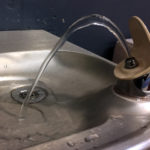 An average circus class length is 1-2 hours, depending on the class. The following tips are all based around that time frame, as the rules change for those training over 2.5 hours. When thinking about hydration it is important that intake is balanced throughout the day, versus drinking a large amount in one sitting, especially right before class. Research shows us that hyperhydration (too much water) can be just as negative on our bodies as dehyrdation (not enough water).
An average circus class length is 1-2 hours, depending on the class. The following tips are all based around that time frame, as the rules change for those training over 2.5 hours. When thinking about hydration it is important that intake is balanced throughout the day, versus drinking a large amount in one sitting, especially right before class. Research shows us that hyperhydration (too much water) can be just as negative on our bodies as dehyrdation (not enough water).
Here are a few general concepts for drinking water both before and after class:
- Drink water throughout the day. Trying to hydrate all at once right before class can be as bad as being dehydrated
- Drink a light amount of fluids during exercise (about 100-200ml per 20 mins)
- Increase water intake for 1.5 – 2 hours after your work out
When it comes to food, we want to pay attention not only to what we are ingesting, but also when we are ingesting it. The food we choose to eat is what is going to be broken down in order to fuel us for training and 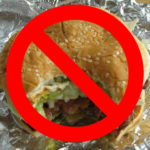 promote recovery afterwards. Food can be broken into three parts: Carbohydrate, Fat, and Protein. Each of these plays a vital role in our health and performance. We often give carbs and fat a bad reputation, but they are actually very useful. Carbohydates help to create instant fuel for our bodies and good fats such as Omega 3 fatty acids are essential for our cell membranes and can help decrease inflammation in the body. What we want to limit or avoid are simple refined sugars (such as soda) and high levels of saturated fats (specifically trans fats found in foods such as French fries and that greasy burger). Good sources of complex carbohydrates can be found in fruit, veggies and grains. Good (unsaturated) fat can be found in foods like nuts and fresh coldwater fish. Protein is the third component mentioned above and is fundamental in building and repairing muscle tissue. While the commonly known high protein foods are meats, there are also many plant based proteins, such as beans, legumes, and nuts to round out a balanced diet.
promote recovery afterwards. Food can be broken into three parts: Carbohydrate, Fat, and Protein. Each of these plays a vital role in our health and performance. We often give carbs and fat a bad reputation, but they are actually very useful. Carbohydates help to create instant fuel for our bodies and good fats such as Omega 3 fatty acids are essential for our cell membranes and can help decrease inflammation in the body. What we want to limit or avoid are simple refined sugars (such as soda) and high levels of saturated fats (specifically trans fats found in foods such as French fries and that greasy burger). Good sources of complex carbohydrates can be found in fruit, veggies and grains. Good (unsaturated) fat can be found in foods like nuts and fresh coldwater fish. Protein is the third component mentioned above and is fundamental in building and repairing muscle tissue. While the commonly known high protein foods are meats, there are also many plant based proteins, such as beans, legumes, and nuts to round out a balanced diet.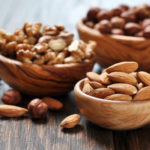
Here are a few general concepts on eating before and after class:
- 30g of carbs within 30 mins of class
- 5-10 g protein 30 mins before class
- Small amount of fat before workout to promote satiety
- 30g of protein within 30 mins after class (this is more for muscle repair versus mass gain)
- 60-90g of carbs post workout (2:1 or 3:1 ratio with protein)
Considering these general concepts, we can look at a few food combinations to create healthy and easy to prepare snacks before and after class. There are countless combinations but a few simple examples of pre-work snacks could be: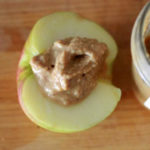
- An apple and a spoonful of almond butter
- Banana and a ¼ cup of mixed nuts
- 1 cup of yogurt, granola and fresh berries
When we look at post workout ideas, we can think more of a full meal than a light snack. It may not take a great deal of food to get through a 60 min training session, but we want more food for recovery.
Examples of some food combinations for balanced recovery could be: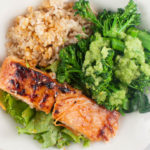
- 3-6 ounces of fresh salmon, 1 cup broccoli, ½ cup brown rice
- 1 cup kale, 1 cup spinach, 3-4 ounces of chicken, olive oil and balsamic vinegar dressing
- ½ block of tofu, ½ cup quinoa, ½ cup black beans
The above listed tips are very general but can provide a start to a strong nutritional foundation to build on. Everyone’s nutritional needs can vary based on goals, training time, and level of fitness/health.
Nutritional supplements are another great option for reaching athletic and nutrition goals but should be used as a supplement to a healthy diet. Starting to pay attention to the foods we eat can drastically improve our level of performance, recovery, and overall well being.



